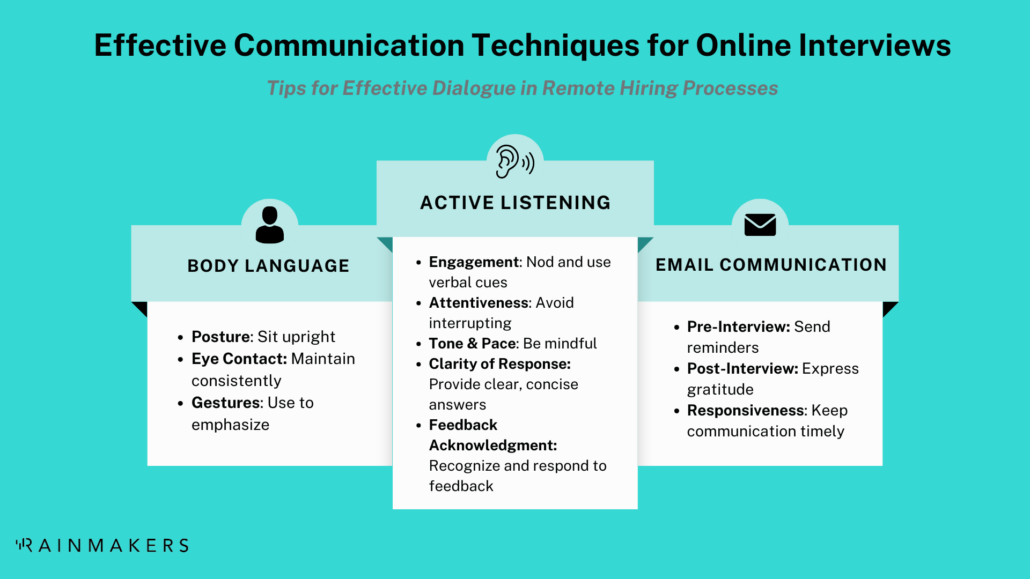Optimal Strategies for Conducting Virtual Interviews
Effective Approaches in Virtual Candidate Assessments
The shift to virtual interviews is common in today’s job market, and HR teams must be equipped with the best techniques for conducting and evaluating interviews in this format. As we continue to navigate the challenges of remote work and virtual interactions, it’s essential to adapt our approach to ensure that we can still identify the best talent for our organizations.
Whether you’re a seasoned HR professional or new to the virtual interview process, there’s always room to learn and improve. So, let’s dive into some effective techniques to help you conduct successful virtual interviews and make informed hiring decisions.
Technical Setup for Virtual Interviews
Virtual interviews have become increasingly common. Whether you’re a job seeker or a hiring manager, ensuring you have the technical setup to conduct or participate in virtual interviews is crucial. Here are some essential tips on technical preparations for virtual interviews:
Hardware Requirements:
- Computer: Ensure that you have a reliable computer. A laptop or all-in-one desktop with a built-in webcam and a microphone is ideal for virtual interviews. Standard desktops require an extra webcam purchase.
- Webcam: If your computer doesn’t have a built-in webcam, invest in an external webcam. This will enhance the visual quality of your video feed during the interview. Seek webcams with at least 720p, which is decent video quality.
- Microphone: A good quality microphone is essential for clear audio communication. Consider using a headset with a built-in microphone to make things easy to manage. Otherwise, microphones are built into webcams, but you’ll want headphones to avoid feedback.
- Internet Speed: At least 1 Mbps upload and 10 Mbps download at minimum. Increase this depending on how other people use the internet in your home.
Software Requirements:
- Video Conferencing Platform: Familiarize yourself with the video conferencing platform used for the interview. Common platforms include Zoom, Skype, and Microsoft Teams. Some all-in-one recruiting platforms (like Sage) have built-in video conferencing tools.
- Internet Browser: Ensure you have a reliable internet browser installed on your computer. Google Chrome is the most popular browser, giving it widespread support. This is necessary for cloud-based interview systems (like Zoom)
The software side varies heavily depending on the position. For example, if hiring a programmer, you might have technical review software with a live component. But if you’re hiring a sales representative, you won’t need this software. Once the technical side is out of the way, you can work on your review process.

Standardizing the Virtual Interview Process
The interview process needs to be consistent from person-to-person. By creating a standard interview process, you can consistently identify top talent through your virtual interviews. Here are some steps you can take to maintain your consistency:
1. Develop standardized interview questions: Create a list of questions that apply to the role and align with the organization’s values and culture. These questions should be asked of all candidates.
2. Establish interview guidelines: Set clear guidelines for the virtual interview process, including the format, duration, and technology to be used. Ensure that all interviewers are familiar with these guidelines.
3. Train interviewers: Train interviewers on best practices for conducting virtual interviews. This should include guidance on creating a positive candidate experience and evaluating candidates in a virtual setting.
4. Use standardized evaluation criteria: Develop a set of criteria for evaluating candidates and provide this to interviewers.
5. Implement a structured rating system: Create a rating system to evaluate candidates’ responses to interview questions. This can help ensure evaluations are based on specific criteria rather than subjective opinions.
6. Collect feedback from interviewers: After each virtual interview, gather feedback to ensure the process is consistently applied and identify improvement areas.
By following these steps, organizations can ensure a consistent and fair approach to virtual interviewing, resulting in a more effective and objective hiring process.
Communication Skills for Virtual Interviews
Communication skills are important, even with “virtual” in the title. Here are some tips when communicating virtually:
- Ensure that your body language projects confidence and professionalism. Sit up straight, maintain eye contact, and avoid fidgeting or distractions. Additionally, hand gestures can help emphasize key points and express enthusiasm. Even over a webcam, people will notice a lack of confidence.
- Virtual listening is another crucial aspect to consider. It’s important to show active engagement by nodding and using verbal cues to demonstrate that you actively listen and understand the conversation. Avoid interrupting the interviewer, and be mindful of your tone and pace when speaking.
- Set aside time to email the interviewee before and after. The before email should be a quick reminder (which is automatically done by many video software), and the after interview is to thank the interviewee for their time and provide additional instructions. Applicants appreciate responsive employers

Evaluating Candidates Remotely
While the fundamentals of evaluating candidates remain the same, the virtual setting presents unique challenges and opportunities. Here are some strategies for effectively evaluating candidates remotely.
1. Use interview software with built-in evaluation tools
Consider video conferencing software designed for interviews to make the evaluation process easier. This helps you score the candidate during the interview, giving you a better idea of how they felt during the interview. You can also take a second look to evaluate the interview, giving you perspective afterward.
2. Pay attention to the candidate’s virtual communication skills
Paying attention to the candidate’s virtual presence and professional demeanor throughout the interview is crucial. Factors such as their engagement, communication style, and ability to navigate virtual platforms can provide valuable insights into their adaptability and interpersonal skills –essential in a remote work environment.
3. Treat it like a normal interview
Despite having the word “virtual” in the title, virtual interviews should be treated like regular interviews. This means you should ask all of the same questions you would during the “regular” interview, plus a few others to assess remote-specific skills. To get yourself in the right headspace, do everything you normally do for an interview. So if you wear a suit, wear a suit (not a suit and pajama pants from the waist down).

Interviewer Etiquette in a Virtual Environment
There are a few things unique to interviewing in a virtual environment. Below, we review some etiquette-based tips to remember before, during, and after the interview.
Before the interview…
Know your tech
Familiarize yourself with the technology and platforms used: Zoom, Skype, or another video conferencing tool. Interviewers should test their audio and video equipment beforehand to ensure everything is working properly and have a backup plan in case of technical difficulties.
Set the stage
Create a quiet and distraction-free environment. This means finding a suitable location with good lighting and a neutral background and minimizing potential interruptions. Being mindful of their surroundings and appearance can help interviewers establish credibility and command respect from candidates.
Be prepared and organized.
Have a clear agenda and questions prepared, and follow a logical flow throughout the interview. Interviewers should also allocate sufficient time for candidates to ask questions and address any concerns, as this can help candidates gain a better understanding of the role and the company.

During the interview…
Put candidates at ease.
Start the interview with a friendly and warm greeting and engage in small talk to break the ice. Interviewers should also make a conscious effort to maintain good eye contact and active listening throughout the interview, as this can help convey genuine interest and empathy towards the candidate.
Know your tone and body language.
Speaking clearly and at a moderate pace can improve comprehension and minimize misunderstandings, while a calm and reassuring tone can help create a positive and comfortable atmosphere. Interviewers should also be mindful of their body language, as nonverbal cues can be just as important in virtual interviews as in face-to-face interactions.
Remove distractions
Refrain from multitasking, such as checking emails or text messages, and focus on the candidate’s responses and body language. Interviewers should also refrain from interrupting or talking over candidates and allow them to express themselves fully.
After the interview…
Provide feedback
This can help candidates understand their strengths and areas for improvement and contribute to a positive candidate experience. Even if a candidate is not selected for the role, providing respectful and thoughtful feedback can leave a lasting impression and contribute to the employer brand.
Follow up professionally
Whether sending a thank-you email or providing updates on the hiring process, interviewers should maintain open and transparent communication with candidates. This can help candidates feel valued and respected and contribute to a positive and lasting impression of the company.
Top Industries and Positions Utilizing Virtual Interviews
Professionals in various industries are often well-versed in remote work and are comfortable using video conferencing tools for communication. Here are some industries where you can find virtual interviews:
- Tech: Commonly used for software engineering, web development, and data analysis positions. Candidates are often required to showcase their technical skills through virtual coding challenges and whiteboard exercises.
- Finance: For positions such as financial analyst, investment banker, and accountant, candidates may be asked to analyze financial data or present case studies through video conferencing.
- Healthcare industry: Frequently used for nursing and telemedicine positions. Candidates may be required to demonstrate their clinical knowledge and patient interaction skills through virtual scenarios and role-playing exercises.
- Customer service: Utilized for positions such as call center representative and technical support specialist, where candidates may undergo virtual role-playing exercises to assess their communication and problem-solving abilities.
- Sales: During a virtual interview, a sales rep may be asked to present a case study or give an example of how they successfully closed a deal in the past.

Wrap Up
In some ways, virtual interviews do not differ from regular interviews, just with a bit more hardware. If you can overcome the technical challenges, there are many ways to make remote interviews just as effective as their in-person alternatives. In some ways, remote interviews are easier, as you can track assessments and see how someone can handle remote work.
If you’re looking for your next remote sales professional, use Rainmakers. Our system matches top-performing sales staff with companies that need the best talent. To learn more, sign up for an account today.










